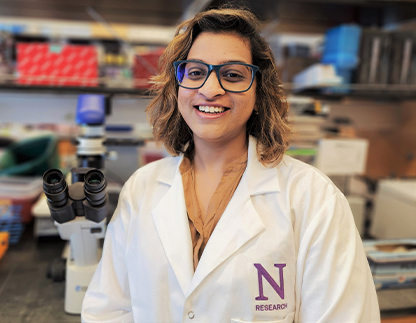I've always loved learning about humans or plant biology, and by middle school, I knew I wanted to be a biologist.”
Tanvi Potluri (she/her)
PhD Candidate in the Driskill Graduate Program in Life Sciences in the Department of Obstetrics & Gynecology

Tanvi Potluri is a PhD candidate in the Driskill Graduate Program in Life Sciences in the Department of Obstetrics & Gynecology at the Feinberg School of Medicine. She has research experience in reproductive sciences, muscle physiology, and immunology. Her research largely focuses on using preclinical models to translate findings to a clinical or public health setting. Tanvi also is the president of the Chicago Graduate Student Association (CGSA), which acts as a collective voice for graduate students on the Chicago campus.
How would you describe your research and/or work to a non-academic audience?
My research started with a chance finding in my lab. When the Bulun Lab was studying breast cancer, they inserted a human version of a gene called aromatase into mice. This is a very fascinating gene that converts testosterone to estrogen in various tissues. However, all the male mice with this humanized aromatase gene developed large scrotal hernias. With that, the lab developed the first model to study hernias. My focus is to understand this mechanism and figure out how estrogen is causing herniation.
What is the biggest potential impact or implication of your work?
One in four men develops inguinal hernias in their lifetimes. The only way to fix this is via surgery. Now, we hope to develop drugs that could strengthen the abdominal muscle that can treat hernias non-surgically.
How do you unwind after a long day?
My favorite activity is to put on a sci-fi or thriller TV show and knit or crochet. I just finished a lace shawl I'm proud of while watching all of Dr. Who.
What books are on your bedside table?
I've been into audiobooks lately—particularly when I have long, repetitive experiments. I'm listening to American Rascal by Greg Steinmetz and J.R.R Tolkien’s Silmarillion.
What inspires you?
I gain a great deal of satisfaction from fixing flaws, troubleshooting, or revitalizing something. I get to do much of that in my research, which is my primary motivator.
What did you originally want to be when you grew up?
“I've always loved learning about humans or plant biology, and by middle school, I knew I wanted to be a biologist.”
Published: October 18, 2022
If you know a graduate student, postdoctoral trainee, graduate faculty member, staff member, or a member of our TGS alumni population who would make a great candidate for our TGS Spotlight Series, please complete this brief TGS Spotlight Series Nomination Form.